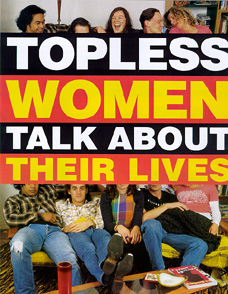
Eugs converses with Director Harry Sinclair, about his successful debut film 'Topless Women Talk About Their Lives', thoughts on cinema, New Zealand, and plans for the future.
Most aspiring filmmakers never make it past the script stage because of a lack of interest or funding, yet you managed to secure Government funding without a written script or previous experience in directing films. Tell us how!Well the funding process was actually quite informal. I submitted a treatment to 'NZ on Air', they liked it and commissioned a series of low-budget television shorts for TV3. The success of this series paved the way for the film.
How much funding did you get?
To tell you the truth I'm not really sure! The film cost around $300 000 to
shoot, but totalled roughly $1.4 million after post production. Post production
actually took up most of the budget. Processing the film and sound was an
enormous cost. I don't know the specifics. I prefer not to think about. The
actors were all paid though.
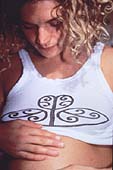 Topless Women is different
in that it is the result of an ad hoc approach to filmmaking, yet its narrative
still fairly coherent. What gave continuity to your ideas?
Topless Women is different
in that it is the result of an ad hoc approach to filmmaking, yet its narrative
still fairly coherent. What gave continuity to your ideas?
Well Danielle's unexpected pregnancy sparked off the idea for the film. It
was a rare opportunity to work with a real life pregnancy so I re-wrote the
script around her. There was also a lot of history already set up in the television
series, the cast was already familiar with their characters and relationships
with each other. The actors were very involved in the script from the beginning
- as I had worked with most of them before, their characters were written
with them in mind. For example, the character of Ant was inspired by this
insane look I noticed in Ian's eye one day. He just had this look that told
me he would make a great maniac! We worked on the movie six months full-time.
Each weekend was comprised of two ten hour shoots.
Were there many continuity
problems involved in shooting the movie week to week? For example, there's
the scene where Ant is stomping down a street and then suddenly realises he's
completely naked - in the next shot he's wearing his knitted Harley Davidson
jumper, different from the one he had in the previous shot. Was that due to
having to write and shoot scenes out of order?
Hey I didn't notice that! The film was shot fairly sequentially, any continuity
problems occured because of changing the order of scenes in editing.
How much planning was involved
for the weekend shoots. Did you storyboard the script?
Oh god no, the only real preparation was Dale and I visiting locations prior
to shooting and discussing shots. Then I would write the script during the
week, give it to actors on the morning of the shoot. On average we shot up
to 3 takes a scene.
The promotion for the film
emphasises the fact it was made in Auckland with slogans like 'Auckland rocks',
yet there is a common prejudice amongst Kiwis against Auckland and Aucklanders,
who have a reputation for being self-conceited elitists, as if Auckland was
the cosmopolitan cultural centre of New Zealand. Do you see the film as being
an idiosyncratic product of Auckland?
Yeah it's funny, the rest of New Zealand is anti-Auckland. When I went to
Dunedin I was asked 'Do you think this film will work outside of Auckland?'
And I was taken aback, like 'What?! Are you serious?' I think Topless
is a non-Auckland movie. It could be set anywhere, cities being mostly the
same wherever you go. That's part of it's appeal, I think.
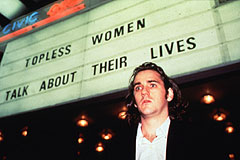 When did you know you were
on to something good? Were you confident of success from the very beginning
of production?
When did you know you were
on to something good? Were you confident of success from the very beginning
of production?
I had no expectations whatsoever, when you work on a project for so long you
tend to be too close to it. I didn't really know whether it was a good or
bad film until the first screening at the Sydney Film Festival where I thought,
'Hey people really like it!' And even then not until the end. It was actually
quite a surreal experience getting up on the stage to introduce the film,
as the State theatre is very similar to the cinema in which Ant's film premiered.
It makes you think 'Are they clapping because they liked it or out of politeness?'
What criticisms have you received?
None really, except for this Lebanese director who hated the camera movement,
and said the movie had 'no depth.'
That's surprising considering
New Zealand's reputation for Scottish puritanism. You'd expect at least a
little controversy concerning the film's title and unabashed content?
Yeah, New Zealand is quite a brutal culture - it's basically a repressed rugby
society. Anyone working in the Arts is considered to be a wanker. It can make
it hard to be creative. If anything, this film is a reaction against Scottish
Puritanism - hence the title. I wanted to be deliberately confrontational,
but there was no moral outrage or anything like that. It's a shame really.
I'm rather disappointed - we could have used it for publicity!
Films from this part of the
world have gained a reputation for being quirky. Why is that?
Well New Zealand films are interesting because it's a slightly odd place.
It's eccentric. You can't quite tell where the ideas are coming from.
Let's talk about some of those
ideas. What inspired the opening scene? The script scattered across the beach
is a very striking image. And the German tourist!
It happens a lot. The Piano was very big in Germany so we get a lot of German
tourists seeking the authentic Piano experience on those beaches. I hear they're
frequently disappointed to find the piano isn't still standing there in the
waves.
When Ant seeks refuge at Mike's
house, Mike's flatmates are rolling joints with some very realistic-looking
grass. Were the drugs used in the movie real?
They were actually! Oh god am I allowed to say that?
We're students. You can tell
us anything.
Yeah the grass was real, but 'cabbage' quality. It wasn't good stuff. I think
the whole crew was slightly stoned that day. One of the focus pullers, who
was quite conservative, got a bit upset that the actors were smoking it.
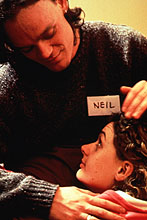 Danielle's birth scene was
also very realistic, was any of the footage authentic?
Danielle's birth scene was
also very realistic, was any of the footage authentic?
No, to capture the real birth the crew would have had to hang around for weeks.
We gave Peter Jackson (of Heavenly Creatures fame) a call, since he's a friend
of mine and runs a Special Effects company. They supplied us with an umbilical
cord, which we then stuck on a four day old baby smeared with lots of cream
cheese and jam.
Everyone in the film has relationship
problems. It's a pretty bleak vision. Was this based on any personal experience?
That's an interesting observation. I guess my view of relationships is that
they're inspired by the fear of being alone more than anything else. And all
relationships have problems. More people today are lost since tight social
structures have ceased to exist. In a way you could say the film is about
lost youth.
Ant's film is supposedly made
in Germany, with German actors. How did you make his film?
The German scenes were actually shot in Auckland, we advertised in the local
papers for German speaking women. The woman kneading the dough actually worked
in a German bakery. It was funny - these women all thought New Zealand was
too prudish a society, so they were quite happy to get naked for the movie. They
didn't see what all the fuss was about.
How about the actors - nearly
all of them have a nude scene or sex scene. Was there any nervousness?
No not really. It was a very small crew, and everyone knew each other. There
was a great sense of trust. The only incident was with Ant who was nervous
about getting naked on a street in full daylight. We actually asked the police
for permission to shoot that scene, which was a mistake because they told
us 'Absolutely not. Under no circumstances are you to shoot that in public'.
We did it anyway and almost caused an accident! This lone car surprised us
midshoot, lost control and almost hit a lightpole.
Below: Harry Sinclair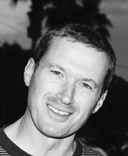 You are an established actor,
yet you remain behind the camera for the entire film. Is this indicative of
the direction your career is taking?
You are an established actor,
yet you remain behind the camera for the entire film. Is this indicative of
the direction your career is taking?
Well having acted many small roles I find the military precision depressing.
I prefer working in a naturalistic, relaxed environment, which you can only
really get when you're directing. What I do best is get good performances
out of actors. I'd rather be a film director than a moderately good actor.
You didn't have formal training
as a director, so you must have learnt a lot just from watching films. Which
ones in particular have influenced your ideas and method?
The films I like really had no influence on this one. But my favourite films
would have to be Chinatown, Raging Bull, Peter Jackson's Heavenly Creatures
and all of Jane Campion's films. I like the real world aesthetic. The cinematography
in Topless was oriented around the actors. The camera moved to find
actors, not vice versa.
How did you decide on the soundtrack?
It sounds a lot like Harry's Top 10. Did you have certain songs in mind when
you shot a scene, or were the music considerations made post-production?
I'm friends with the guys who run Flying Nun and I wanted to support the independent
label. So the soundtrack is comprised of my favourite Flying Nun songs, which
I chose during the editing process to match each scene.
Low-budget endeavours require
a lot of patience and generosity on the set, with all sorts of people spending
long hours together for little or no money. Was there any tension on the set
during production?
Well most of us were friends or knew each other from previous productions.
The acting community in Auckland is very small. I like the ensemble feeling.
There are maybe a few hundred or so actors in NZ, and that's including all those who say they're actors - all the waiters and waitresses.
How many of them have actually acted professionally? Not many. Anyway Daniel,
Joel and Willa were all friends. There was a little tension on the set, but
that happens with all productions. One boom swinger was particularly annoying,
she got in the way a lot. I would scream at her and she would scream back
at me. But apart from that, we were all fairly close.
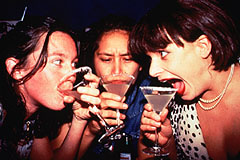 Having formed such a close
working relationship with your crew, do you plan to recast any of them in
your upcoming projects?
Having formed such a close
working relationship with your crew, do you plan to recast any of them in
your upcoming projects?
I can't afford them anymore! I have to find new actors as the ones in this
film are now too successful. Besides, I've run out of ideas for those characters.
It's hard to let go, I'm a little scared of where to go next.
Well now that you've had your first success, you're bound to get offers from overseas. This part of the
filmmaking world seems to suffer from this talent drain. Do you think you'd
leave NZ?
No I don't think I'd move. I have a sneaking suspicion my ideas come out of
NZ. I think I'm a little bit too weird for the Americans. Hollywood offers
loads of money but little of the control that allows creativity. So far I
haven't received any offers.
In the eyes of the world New
Zealand and Australia are closely associated, yet there is a strange dynamic
between the nations, of similarity and enmity.
Yeah NZ and Australia have an odd relationship. Australia is so close, proximity
wise, yet New Zealanders don't really think about it being there. There's
very little cultural connection between the two. Which is funny since we're
both so isolated, not really part of the Orient, Europe or the US. Actually
I remember seeing this guy in Auckland wearing a T-shirt that said "I'll support
the NZ team or any other team playing Australia."
It's like a brother and sister
relationship. Sibling rivalry.
Yeah with New Zealand as the little brother! Australians seem to enjoy being
patronising.
Oh yeah. We learnt it from the movies.
eugene chew
comments? email the author